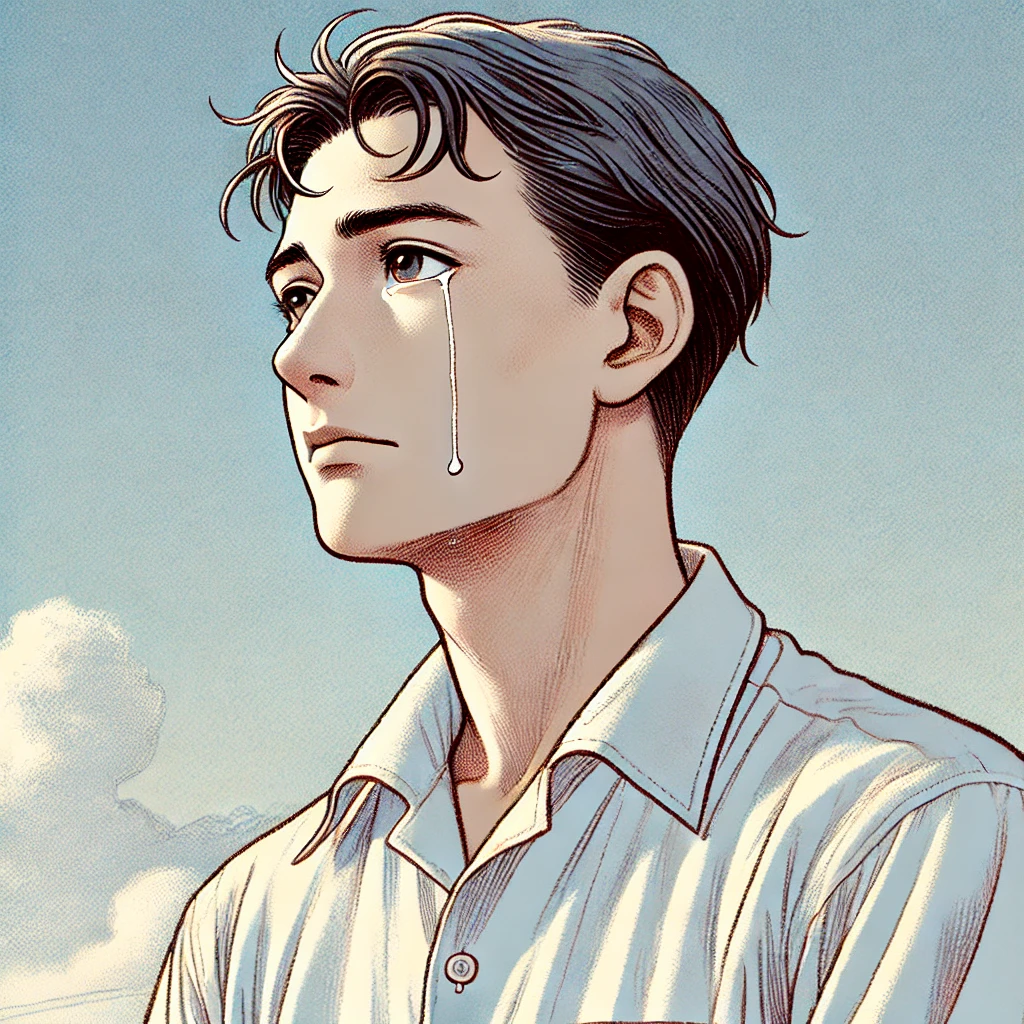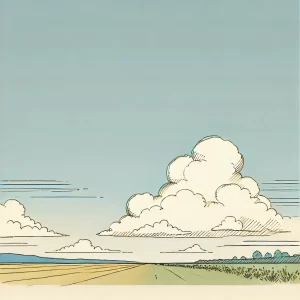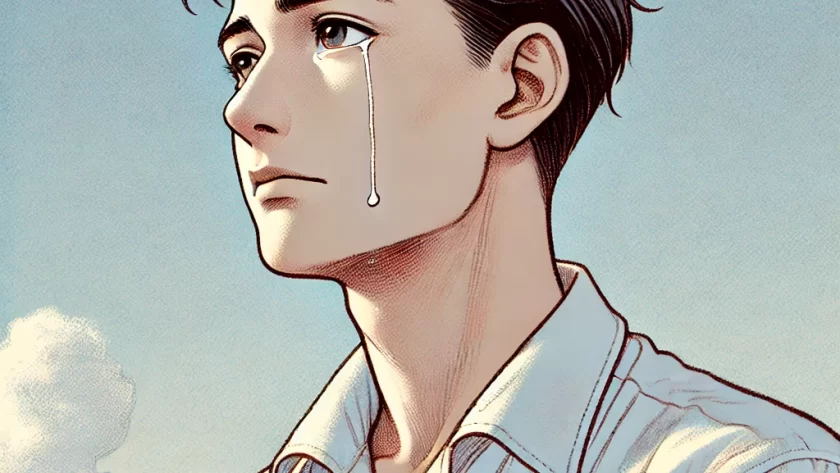悲しくてやりきれない [Kanashikute Yarikirenai]
ザ・フォーク・クルセダーズ [Za Fōku Kurusedādāzu]
Words : サトウハチロー [SATŌ Hachirō]
Music : 加藤和彦 [KATŌ Kazuhiko]
The Folk Crusaders, whose Kaettekita Yopparai became a massive hit, planned to release Imujin River as their second single. However, due to the song’s release being cancelled, they created a replacement song: Kanashikute Yarikirenai.
The lyrics were written by the poet Hachirō Satō, who is known for penning many famous children’s songs.
胸にしみる 空のかがやき
mune ni shimiru sora no kagayaki
今日も遠くながめ 涙をながす
kyō mo tōku nagame namida o nagasu
- 胸(むね) [mune] : chest
- しみる [shimiru] : seep
- 空(そら) [sora] : sky
- 輝き(かがやき) [kagayaki] : brightness
- 今日(きょう) [kyō] : today
- 遠く(とおく) [tōku] : far away
- ながめる [nagameru] : gaze
- 涙(なみだ) [namida] : tears
- 流す(ながす) [nagasu] : shed (tears)
(translation) “The brilliance of the sky pierces my chest.
Today again, I gaze far away and shed tears.”

悲しくて 悲しくて
kanashikute kanashikute
とてもやりきれない
totemo yarikirenai
このやるせない モヤモヤを
kono yarusenai moyamoya o
だれかに告げようか
dareka ni tsugeyō ka
- 悲しい(かなしい) [kanashii] : sad
- とても [totemo] : very
- やりきれない [yarikirenai] : unbearable
- この [kono] : this
- やるせない [yarusenai] : hopeless
- モヤモヤ(もやもや) [moyamoya] : frustration
- 誰か(だれか) [dareka] : someone
- 告げる(つげる) [tsugeru] : tell
(translation) “Sad, so sad, unbearably sad.
Should I tell someone about this hopeless frustration?”
The title of this song means “sad and unbearable.”
“もやもや / moyamoya” originally refers to a misty, unclear scene, as if fog is rising and blurring the view. “もや / moya” refers to mist, and from that, it came to represent a sense of inner frustration.
What is the sadness about? Some say these lyrics are based on Hachirō Satō’s experience of war. He lost his brother in the Hiroshima atomic bombing wiki.

白い雲は 流れ流れて
shiroi kumo wa nagare nagarete
今日も夢はもつれ わびしくゆれる
kyō mo yume wa motsure wabishiku yureru
- 白い(しろい) [shiroi] : white
- 雲(くも) [kumo] : cloud
- 流れる(ながれる) [nagareru] : flow
- 夢(ゆめ) [yume] : dream
- もつれる [motsureru] : tangle
- わびしい(わびしい) [wabishii] : lonely
- 揺れる(ゆれる) [yureru] : sway
(translation) “White clouds drift by,
tangled dreams sway in loneliness.”

悲しくて 悲しくて
kanashikute kanashikute
とてもやりきれない
totemo yarikirenai
この限りない むなしさの
kono kagirinai munashisa no
救いはないだろうか
sukui wa nai darō ka
- 限りない(かぎ りない) [kagirinai] : endless
- 虚しさ(むなしさ) [munashisa] : emptiness
- 救い(すくい) [sukui] : salvation
- ない(ない) [nai] : none
- だろうか(だろうか) [darō ka] : could there be
(translation) “Sad, so sad, unbearably sad.
Is there no salvation from this endless emptiness?”
深い森の みどりにだかれ
fukai mori no midori ni dakare
今日も風の唄に しみじみ嘆く
kyō mo kaze no uta ni shimijimi nageku
- 深い(ふかい) [fukai] : deep
- 森(もり) [mori] : forest
- みどり [midori] : greenery
- 抱く(だく) [daku] : embrace
- 風(かぜ) [kaze] : wind
- 歌・唄(うた) [uta] : song
- しみじみ [shimijimi] : deeply
- 嘆く(なげく) [nageku] : lament
(translation) “Embraced by the deep forest’s greenery,
I deeply lament to the song of the wind.”
悲しくて 悲しくて
kanashikute kanashikute
とてもやりきれない
totemo yarikirenai
このもえたぎる 苦しさは
kono moetagiru kurushisa wa
明日も続くのか
ashita mo tsuzuku no ka
- 燃えたぎる(もえたぎる) [moetagiru] : burning
- 苦しさ(くるしさ) [kurushisa] : suffering
- 続く(つづく) [tsuzuku] : continue
(translation) “Sad, so sad, unbearably sad.
Will this burning suffering continue tomorrow?”
Kanashikute Yarikirenai is a song about profound sadness and suffering with no clear resolution.
In the 2016 animated film In This Corner of the World, a cover of this song by Kotoringo was used as the opening theme.
YouTube Search “Kanashikute Yarikirenai – The Folk Crusaders”
Let’s also introduce Imujin River, which had its release postponed. The lyrics ask a bird why it cannot return to the homeland across the Imjin River, deepening the longing for home. The Korean Peninsula has been divided into North and South since the Korean War (1950–1953), and the Imjin River, near the demilitarized zone, has become a symbol of that division.
The song was originally a North Korean piece composed in 1957. Tatsuya Matsuyama, who later worked with The Folk Crusaders and the Sadistic Mika Band, learned of the song during his time in junior high school in Kyoto through interactions with students from a Korean school. He perceived the song as an unknown Korean folk song. Since he only knew the first verse, he wrote the second verse to reflect the sorrow of division between North and South. However, it turns out that the original song expressed Northern superiority.
The song’s release was canceled for several reasons, including ethical concerns and the lack of diplomatic relations between Japan and North Korea, making it impossible to release it as a North Korean song.
In the 2004 film Pacchigi!, music like Kanashikute Yarikirenai and Imujin River plays a central role in the story. Although the portrayal of Imujin River as a symbol of peace and other aspects of the film are debatable, the depiction of Kyoto’s atmosphere and the music scene at the time is quite realistic, making it a engaging film.
The rise of The Folk Crusaders also sparked a new underground folk movement in Kansai, different from the folk music before it, emphasizing anti-war messages and other themes. Artists like Tomoya Takaishi, Nobuyasu Okabayashi, as well as Wataru Takada and Kenji Endo, who later relocated to Kansai, are some of the notable musicians of this movement. In the late 1960s, this underground scene evolved, paving the way for a new wave of music in the 1970s, such as Happy End and Yōsui Inoue.
Thanks for reading! Feel free to comment if you have any feedback or questions.
Follow me on X.



